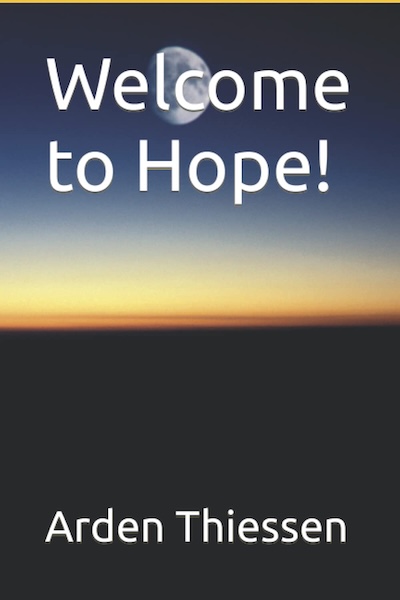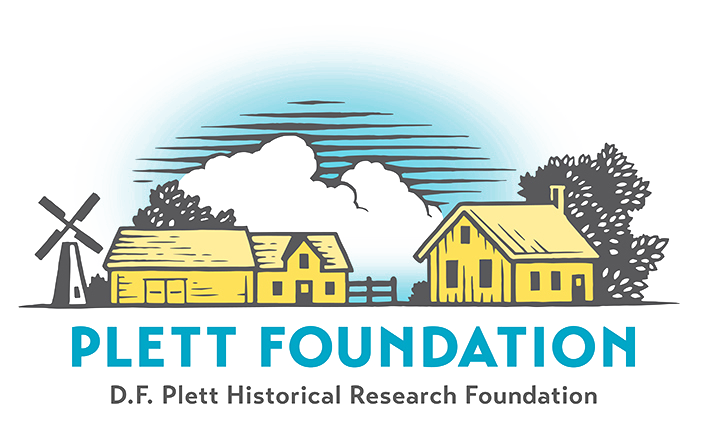Review: Welcome to Hope!
Ralph Friesen
Welcome to Hope!
By Arden Thiessen
Self-published, 2019, pp. 223. Softcover.
Reviewed by Ralph Friesen

On the back cover of Arden Thiessen’s new book, Welcome to Hope!, stands a tongue-in-cheek warning: “This book may offer more hope than some readers may appreciate.” What does he mean? Likely he’s talking about his views on eternal punishment. Essentially, he does not believe in such a thing. Thiessen has dispensed with the need for a hell of eternal, literal fire. Biblical references to an eternal hell, he says, should be understood figuratively. Further, he believes that God’s grace is so great that it extends beyond death – so the billions once assumed “lost” by literalists may be “found” after all, in God’s greater scheme of things.
That is indeed more hope than some readers may appreciate. Thiessen does affirm his literal belief in a triune God and the physical resurrection of Jesus Christ. But many of his readers, including those in his own Evangelical Mennonite Conference (EMC), may fear that a figurative understanding of any part of Scripture opens a Pandora’s box of doctrinal ambiguity and confusion.
Nevertheless, Thiessen forges cheerily and hopefully ahead with an optimistic narrative that sometimes is not easy to distinguish from the declamations of prosperity gospel types such as Joel Osteen. (Not that Osteen doesn’t have some valid things to say about the inherent worth of the individual in God’s eyes). Thiessen admits to having pessimistic tendencies, but these are hardly to be found in Welcome to Hope! (with an exclamation mark).
Thiessen does allow himself to engage with the problem of evil in the world, especially human evil, and again his answer is not what I would have expected from an EMC pastor: God is not in control. Apparently, Thiessen has been reading Harold Kushner’s When Bad Things Happen to Good People. Basically, God gives freedom to humans, and regrettably, we take advantage of this gift to do bad things. Further, God gives freedom to nature, putting in place nature’s laws, but not deciding how they will come into play at any given time or place (much less influencing the outcome of football games).
In the context of literalist evangelicalism all this must feel like radical “stuff,” to use one of Thiessen’s favourite words. He self-publishes, so he can say what he wants. And, although well into his eighties, he is a going concern, having produced a book in each of the last four years. No wonder that, for him, Heaven is not a static place of rest, but a dynamic environment of growth and learning.
It happens that I am working on translations and interpretations of a Kleine Gemeinde minister who wrote and preached his sermons about 130 years ago – my great-grandfather Abraham L. Dueck of Kleefeld. It occurred to me that I might look at Thiessen’s book in the context of my ancestor’s beliefs, which in turn are probably a fairly accurate reflection of the beliefs of the Kleine Gemeinde in his time. The Kleine Gemeinde, of course, being the church from which the EMC sprung, and the church also of Thiessen’s ancestors.
Thiessen himself does not evince much interest in the past, or in looking to the past for guidance: “the high priest of this mythical religion of the past is the historian,” he says. He doesn’t like historians? In his view we should be looking instead to the future to give us direction. “Our God is the God of forward progress.” I must apologize, ahead of time, if my method of comparison to texts from the past is unfair to Thiessen’s premise. Or could Abraham Dueck’s thinking provide some instructive context for Thiessen’s approach?
I have translated four of Dueck’s sermons, written from 1895 to 1896, and will quote from these, apologizing once more (this is our tradition!) for any inaccuracies or misrepresentations resulting from my sometimes impatient grappling with my dear ancestor’s opaque, almost stream-of-consciousness German, rendered originally in the old Schrift (or script).
Dueck often speaks of the hope he and his congregants had, as traditional Mennonites. For example: “We as believers, firm in our hope, understand that it has been freely promised to us that we can be in right relationship to God, and place all our cares upon him” (April 1896). This is perhaps not so very different from Thiessen’s hope (and belief) that God is lovingly present with us in even the darkest times. Dueck, however, places more emphasis on the importance of right relationship – so his hope is somewhat more conditional. For Dueck, right relationship requires both repentance of one’s wrongdoing and offering forgiveness when wronged by others.
Thiessen devotes several pages to “forgiveness,” which Dueck also addresses in his sermon in preparation for communion (April 1896). Both quote Matthew 6:14: “If you forgive others their trespasses, your heavenly Father will also forgive you.” Dueck, however, makes sure to include the next verse: “But if you do not forgive others their trespasses, neither will your Father forgive your trespasses.” Thiessen, less stringent, is open to at least the possibility of divine forgiveness even for those of us who stubbornly hang on to our hurts and grievances. Even so, he says that “accepting forgiveness involves admitting to the shame and embarrassment of our sins.” Dueck favours “repentance,” Thiessen “confession.” Maybe there’s not much to choose between them here.
Both authors concern themselves with righteousness, or right action. Thiessen seems to believe that righteousness is only made possible through Christ: “He came to create a new community of purified and holy people who would move out into the world and build the kingdom of God, both by their exemplary living and by their verbal witness.” Dueck does not speak of moving out into the world – the kingdom of God is to be built in his own community. Not that this will be easy: “Before all else practice righteousness, and see to it that wickedness, envy and vindictiveness are silenced through true repentance and renewal” (April 1896). He adds that, in ourselves, we are powerless to do good, so we should “always seek out God’s grace and mercy, so that we never put our trust in any matter, or in any of our deeds, allowing ourselves to think of them as great.” This last is a bit more pessimistic or cautious than Thiessen’s emphasis, though not in contradiction to it.
Both writers are concerned about the end times. Thiessen disagrees with Hal Lindsey-style apocalyptic scenarios of death and destruction, saying that Christ’s return will instead bring about a renewal of heaven and earth. Dueck frequently warns his listeners not to be complacent: “We all concede, do we not, that we now live in the end times?” he asks rhetorically (November 1896). His concern with this situation is invariably ethical – if we are living in the end times, in a period of grace, then it is of the utmost importance to behave like a true follower of Jesus. Dueck and Thiessen both quote 2 Peter 13: “We are looking forward to a new heaven and a new earth, where righteousness dwells,” and both take this more as a hopeful promise than a vengeful threat.
In his chapter “Hope in the Presence of Death,” Thiessen helpfully outlines three answers that Christian scholars have given to the question of what happens when a person dies. In one, the person is “totally dead,” but held by God until the end-time resurrection. In another, the body dies but the soul continues, to be held in some intermediate state, waiting for the resurrection. In the third, people are “transformed at the point of death into their eternal form” and enter into heaven — resurrection is immediate. Thiessen cautiously favours this last idea but acknowledges that, whatever the case, “resurrection is an inexplicable mystery.”
Dueck employs a metaphor that his peasant farmer congregation would readily have understood, saying that after death we are “gathered together either to be stored as wheat in God’s granary or as chaff to be burned with eternal fire” (February 1896). He expresses the traditional Kleine Gemeinde position that the dead rest in some sort of suspended state until the resurrection day and the Last Judgement. Only then will each person be sure of his or her eternal destiny: “You cannot have confidence in eternal salvation, though I dearly hope that all of us may attain it” (April 1896). Dueck’s “dear hope” is much more tentative than Thiessen’s bold statements of what happens to us after death.
Essentially, Dueck says: “We don’t know.” For his part, Thiessen does not tolerate not-knowing very well; it seems to undermine his idea of hope, which is wrapped up in certainty. Eventually Christ will be victorious and end all evil. “Without the hope of this final victory over evil, the huge question of why the Creator allowed his beautiful world to be invaded by sin would remain an eternal mystery.”
Dueck does not seem to seek an answer to this question, perhaps because he sees God as unknowable, and does not wish to presume. He certainly wrote many more sermons than the ones I have had access to, so maybe he says something about this elsewhere. But in the record that I have, he is not much concerned with a triumphantly victorious Christ. He gives many warnings against evil and wrongdoing; perhaps he just got into the habit of battling endlessly and was afraid to relax his guard. The closest he comes to imagining a future without evil is this: “Then all true believers will find themselves together with each other again, no longer saddened by death. There we will be found in the steady hand of the Creator, and there unhindered springs of peace will flow, in that homeland with no tears, where the conqueror has prepared a city of noble peace, a hope for all who have fought for so long and all life-weary wanderers, where no one will get tired of life any more (February 1896.)”
Given an expanded definition of “true believers,” Thiessen could probably agree with such a vision. The Kleine Gemeinde passed from an inward-focused ethical Christianity to an EMC born-again missionary theology – with (mostly unacknowledged) notions of superiority and exclusion common to both. Now Thiessen seems to want to take it to a new manifestation, allowing for a more egalitarian and accepting faith. Will that happen? We can hope, but we can’t know.
